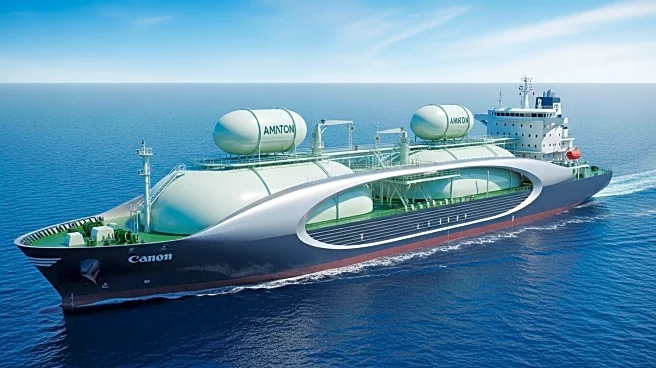What's Happening?
ClassNK has granted approval in principle (AiP) for an ammonia-fueled LPG/NH3 carrier, a project jointly developed by Kawasaki Heavy Industries and MITSUI E&S. This certification confirms the design's feasibility from both regulatory and safety perspectives. Ammonia is gaining attention as a zero-carbon fuel option for ships, as it does not emit CO2 during combustion. The approval follows ClassNK's release of guidelines for ships using alternative fuels, which aim to minimize risks associated with ammonia-fueled ships. These guidelines include requirements for installation, controls, and safety devices. The approval process involved a thorough review of the vessel's design concept and risk assessment, ensuring compliance with safety standards.
Why It's Important?
The approval of ammonia-fueled ships marks a significant step towards reducing carbon emissions in the maritime industry. As global efforts to combat climate change intensify, the adoption of alternative fuels like ammonia could play a crucial role in achieving zero-emission shipping. This development is likely to encourage further research and investment in ammonia as a viable fuel source, potentially leading to broader industry adoption. Stakeholders in the shipping industry, including shipbuilders and operators, stand to benefit from reduced environmental impact and compliance with future emissions regulations.
What's Next?
With the approval in principle secured, Kawasaki and Mitsui may proceed with further development and potential commercialization of ammonia-fueled ships. The maritime industry could see increased collaboration and innovation in alternative fuel technologies. Regulatory bodies may continue to refine safety standards and guidelines to support the safe use of ammonia as a marine fuel. Additionally, other companies might explore similar initiatives, contributing to a shift towards sustainable shipping practices.
Beyond the Headlines
The move towards ammonia-fueled ships could have broader implications for global trade and environmental policy. As countries strive to meet international climate targets, the shipping industry’s transition to cleaner fuels could influence regulatory frameworks and economic strategies. This shift may also impact the supply chain for ammonia production and distribution, potentially creating new market opportunities and challenges.









